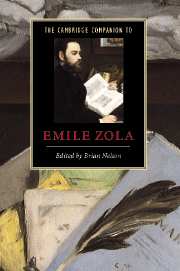Book contents
- Frontmatter
- 1 Zola and the nineteenth century
- 2 Family histories and family plots
- 3 Zola and the representation of society
- 4 Questions of sexuality and gender
- 5 Zola and contemporary painting
- 6 Zola and the art of fiction
- 7 Thérèse Raquin: animal passion and the brutality of reading
- 8 Nana: the world, the flesh and the devil
- 9 Germinal: the gathering storm
- 10 La Bête humaine: Zola and the poetics of the unconscious
- 11 Zola’s utopias
- 12 ‘J’accuse...!’: Zola and the Dreyfus Affair
- Further reading
- Index
5 - Zola and contemporary painting
Published online by Cambridge University Press: 28 May 2007
- Frontmatter
- 1 Zola and the nineteenth century
- 2 Family histories and family plots
- 3 Zola and the representation of society
- 4 Questions of sexuality and gender
- 5 Zola and contemporary painting
- 6 Zola and the art of fiction
- 7 Thérèse Raquin: animal passion and the brutality of reading
- 8 Nana: the world, the flesh and the devil
- 9 Germinal: the gathering storm
- 10 La Bête humaine: Zola and the poetics of the unconscious
- 11 Zola’s utopias
- 12 ‘J’accuse...!’: Zola and the Dreyfus Affair
- Further reading
- Index
Summary
It is often said of Zola that, with the possible exception of Baudelaire, no other nineteenth-century French writer enjoyed a closer or more extended relationship with the painters of his time. By virtue of timing, precisely, and in support of Zola's own modernist credentials, the biographical, critical and creative dimensions of that relationship are largely organised, in our cultural histories, around the Impressionists. This over-simplification relegates to the margins an engagement, on the writer's part, which finds expression in an early enthusiasm for Ary Scheffer and Bastien-Lepage and which ranges, in his work as an art critic over thirty years (either as points of reference or in more substantive reflection), from Ingres to Gustave Moreau. The privileged status of the avant-garde of the 1860s and 1870s, however, is certainly reinforced in the oft-cited remarks made by Zola himself shortly before his death in 1902:
I didn't merely support the Impressionists. Through the brush-strokes, tonalities and colour-values of my own descriptive palette, I brought them into the literary domain. Every one of my books . . . is evidence of contact and interchange with the painters . . . For they helped me paint in a new way, in literary terms.
[Je n'ai pas seulement soutenu les Impressionnistes. Je les ai traduits en littérature, par les touches, notes, colorations, par la palette de beaucoup de mes descriptions. Dans tous mes livres . . . j'ai été en contact et échange avec les peintres . . . Les peintres m'ont aidé à peindre d'une manière neuve, 'littérairement'.]
- Type
- Chapter
- Information
- The Cambridge Companion to Zola , pp. 67 - 85Publisher: Cambridge University PressPrint publication year: 2007



